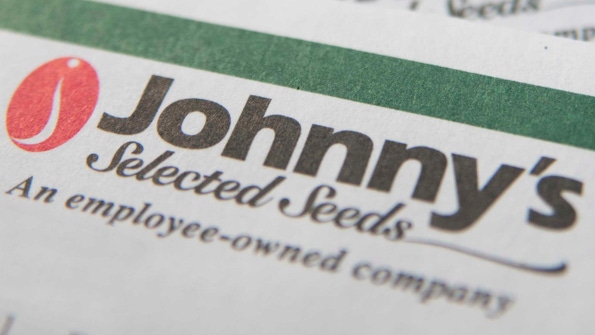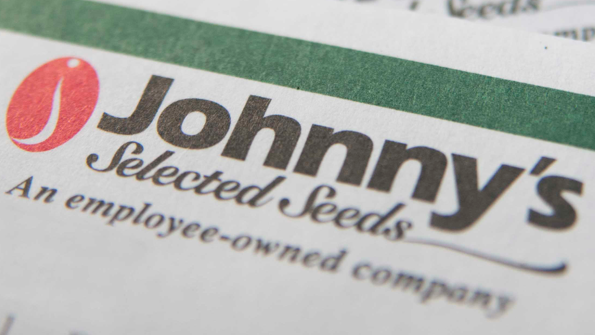Forty years ago, Ron Johnston founded Johnny’s Selected Seeds, and the wealth of heirloom and organic seeds has been growing ever since. Here's how his employee-owned business can inspire your store.
January 28, 2014

 One big reason for the range of produce in our markets these days is actually quite small—seeds. The wide variety of these tiny sources of life available to us today has come a long way. One person we have to thank for our blossoming seed market is Rob Johnston: 40 years ago he founded Johnny’s Selected Seeds, and the wealth of heirloom and organic seeds has been growing ever since.
One big reason for the range of produce in our markets these days is actually quite small—seeds. The wide variety of these tiny sources of life available to us today has come a long way. One person we have to thank for our blossoming seed market is Rob Johnston: 40 years ago he founded Johnny’s Selected Seeds, and the wealth of heirloom and organic seeds has been growing ever since.
Finding a niche

Like what you're reading? Click here for more from Organic Connections.
The year was 1974 and Johnston was working at a small communal farm in New Hampshire that sold vegetables to markets in Boston and New York. Johnston grew frustrated with how difficult it was to source seeds that weren’t for common market vegetables and fruits at that time.
They had a request for Japanese produce from a distributor in New York City, but there weren’t any seeds available. Johnston found the seeds, and the farm was able to grow what was considered then to be exotic vegetables. “We were using some seeds from Japan and Europe that weren’t available in the US at all,” Johnston told Organic Connections. “These were Asian vegetables that were used in Japan but not in the US, like burdock, bok choy and garlic chives. We also had a special kind of Japanese bunching onions and unique melons.”
On the European side, they began selling seeds for carrots not even seen in this country. “It was pretty exciting to bring these developments to my customers, because they wouldn’t see them otherwise,” Johnston recounted.
A seed was planted for a new kind of business that combined his love of working the land and selling seeds. “I figured that there was room for a different approach in the seed business; I thought maybe I could actually make an impact by offering seeds that produced better quality food or better flavor that weren’t currently available.”
Johnston began cultivating these seeds himself to provide to his customers, and with $500 in the bank Johnny’s Selected Seeds was born.
Growing a seed business
A seed business doesn’t grow like wildfire, but Johnston was determined. Amazingly, he never asked for nor obtained a single penny of investment money.
“I started out just on my own, and everything I did I begged or borrowed,” Johnston recalled. “I had friends that worked at a magazine, and they offered to print my catalog. I did tiny press runs so I could afford it—sort of paid as I went. I did practically everything myself.”
Johnny’s catalog stood out among seed catalogs of the time and is still revered by growers. More of a grower’s handbook than a promotional catalog, people would keep it on hand even after they had ordered.
“It built from there. I had friends in Maine that offered me the use of their farm, so in 1974 I moved to Maine to cultivate my seeds.” He bought the farm one year later. “That first year, there were a thousand seed orders and $7,000 was the total income. The second year was $25,000 in sales, and it just kept growing. Somehow I managed to keep my head above water.”
In 1979, before most people even knew what the term organic meant in relation to food, the Albion farm received organic certification from the Maine Organic Farmers and Gardeners Association. Johnny’s certified organic seeds hit the market.
Sourcing heirloom seeds
In the 1970s there was no Internet and very few ways for someone like Johnston to establish a supply network for the types of seeds he was seeking. “I made contacts,” Johnston continued. “I would talk to people, learn about other suppliers and talk to them. I developed a cadre of people that had old varieties. For modern varieties, I knew a couple of innovative seed breeders through the farm I was working on. I also built cooperative relationships through the consulates of a number of different foreign countries; I established letter correspondences with some of the breeders that I learned about from the consulates.”
Johnny’s has always introduced new and exciting seeds, and for a large variety of interests. Gourmets can use the seeds to grow their own radicchio and French radishes, while the company also supplies an entire range of medicinal herb seeds.
In 2000 Johnny’s joined the Safe Seed Initiative, acknowledging that it would not knowingly buy or sell genetically modified seeds or plants.
Today Johnny’s Selected Seeds operates much the same way as in its early days, except on a much larger scale. Seeds are grown and produced on the Albion farm and brought in as well from a global producer. The company continues to seek out older seed varieties that might have gone by the wayside, at the same time making available new and improved varieties from all corners of the world.
“We’ve certainly had an impact on our customers, giving them an economic advantage,” Johnston said. “Our clients are both market gardeners who sell locally and regionally to retail outlets, and avid home gardeners who are growing their own food. Evidently we’ve made an impact, because we have many, many customers who keep coming back.”
Educating about seeds
From the beginning, Johnston felt that educating growers about particular seed varieties was important, as evidenced in his encyclopedic catalogs. That continues to this day. “Education has been a tradition here, because the catalog has always focused on being informative rather than being promotional,” Johnston pointed out. “If you are faced with all these different carrot varieties on the website or on a catalog page, your eyes could glaze over if you didn’t have some help in differentiating one from another. So in the catalog, instead of saying, ‘Everything is wonderful,’ we say, ‘Here’s how one variety compares to another.’ Our job becomes to inform the growers well so they can make their choices.”
Customer as partner
Johnston’s mission has been a simple but powerful one. “My favorite thing is to have somebody say, ‘You know that new carrot I got from you last year—I didn’t do too badly with that,’” he concluded. “It may sound fairly plain, but there’s actually a lot behind somebody saying that. I think we’re serving a purpose: We’re developing teamwork with our customers, where the boundaries get blurred between who’s the customer and who’s the supplier. We’re all in it together to improve the food quality that is available to people.”
In 2012 Johnny’s became fully employee owned, and today the company employees own 100 percent of its stock.
For more information about Johnny’s Selected Seeds, visit www.johnnyseeds.com.
About the Author(s)
You May Also Like




